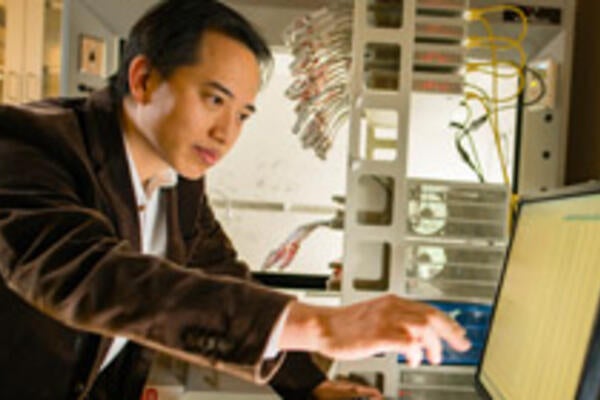
$4.9 million for Waterloo automotive researchers
Engineering researchers will explore lighter, safer and more fuel-efficient cars

Engineering researchers will explore lighter, safer and more fuel-efficient cars
By Staff University of WaterlooReducing weight and fuel consumption while ensuring safety in mid-size cars is one of three initiatives led by University of Waterloo researchers that have received major government funding.
The Natural Sciences and Engineering Research Council of Canada (NSERC) recently announced that the Automotive Partnership Canada program will provide $4.9 million to support three projects being driven by Waterloo Engineering researchers who are part of WatCAR, the University of Waterloo’s Centre for Automotive Research.
“Waterloo is home to the largest concentration of automotive researchers at any university in Canada,” said Pearl Sullivan, dean of engineering at Waterloo. "The funding announced today will be critical for advancing further our world-class research in the development of lighter, safer, and more fuel-efficient cars. The projects will strengthen the technological competitiveness of our automotive industry.”
Lighter car parts
The first project, led by Professor Kaan Inal, will receive more than $2.6 million over four years to research, design and test undercarriage parts made from aluminum alloys using high-performance computing and industrial modelling technologies. The project will also explore a simplified manufacturing process for these parts with the goal to enable their use within mid-size cars such as the Chevrolet Malibu, Chevrolet Impala and Buick Regal after 2017.
“Even a small weight reduction in a vehicle can have a dramatic impact on fuel consumption,” said Inal. “While structural vehicle components can provide the most impact in reducing the weight of a mid-size vehicle, their design must ensure they retain strength and effectively absorb impact energy in the event of a crash.”
Inal’s project team includes researchers from Waterloo Engineering, McGill University, McMaster University and Université de Sherbrooke, as well as partners General Motors, CANMET Materials Technology Laboratory and Sapa. Sapa is a global company focusing on developing, manufacturing and marketing of lightweight material aluminum.
From the lab to the plant floor
Professor Michael Worswick received more than $2 million over the next three years to study a new production process to transform aluminum alloy sheet into complex-shaped parts. Working with industry partner Dana Canada, this research will allow parts currently too difficult and costly to manufacture to be produced, updating traditional stamping processes. The new technology will make vehicles lighter and stronger.
NSERC has supported warm-forming research between automotive parts supplier Dana Canada’s Long Manufacturing Division and the University of Waterloo since 2007. The new funding will move the innovative production process from the lab to the plant floor.
“At the end of three years we will have the computer modelling and process worked out to implement this technology in full production. We believe we are the first university in North America doing such work at this scale,” said Professor Worswick.
Superior crash performance
Professor Kyle Daun was also awarded funding to develop the heat transfer models currently used by Canada’s leading automotive parts supplier, Magna International, in order to optimize designs and refine online control. Professor Daun’s work is expected to result in significant improvements to the efficiency of producing parts as well increase part quality. In the longer term, these heat transfer models will significantly improve productivity and may lead to the development of new heating technologies.
“The end goal of this researchis to develop cars that have superior crash performance with less material,” said Professor Daun. “This saves on manufacturing and material costs, and also produces lighter, and ultimately more fuel-efficient cars.”
Professor Daun’s research team includes Professor Mary Wells from Waterloo Engineering and partnerships with Magna’s Promatek Research Centre and Formet Industries, a division of Magna.

Read more
The Waterloo student team building the world’s first functional pneumatic hyperloop levitation system will share major milestone

Read more
Engineering Professor Zhongwei Chen receives $250,000 fellowship grant to advance his research on low-cost, energy efficient batteries for a more sustainable economy

Read more
Special issue of Waterloo Magazine celebrates women who lead, and explores equity in education and the workplace
The University of Waterloo acknowledges that much of our work takes place on the traditional territory of the Neutral, Anishinaabeg, and Haudenosaunee peoples. Our main campus is situated on the Haldimand Tract, the land granted to the Six Nations that includes six miles on each side of the Grand River. Our active work toward reconciliation takes place across our campuses through research, learning, teaching, and community building, and is co-ordinated within the Office of Indigenous Relations.